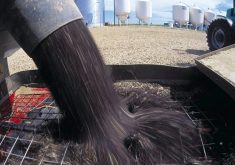MarketsFarm, Reuters – Despite grain movement at Canada’s West Coast ports not being really affected by the British Columbia port workers strike in July, there’s a good chance for issues to arise in the coming months, according to Mark Hemmes, president of Quorum Corp.
“The volume of grain that moved in the last three weeks has been really good. We were clearing eight vessels on an average week. For this time of year that’s not bad,” said Mark Hemmes, president of Quorum Corp.
Read Also

U.S. livestock: Feeder cattle hit contract highs on tight supply
Chicago | Reuters – All Chicago Mercantile Exchange feeder cattle futures and most live cattle futures hit contract highs on…
Quorum is tasked with tracking grain movement throughout Canada and issuing regular reports.
As of Monday, the union representing workers at the west coast ports had reached a settlement agreement, according to a joint statement from the International Longshore and Warehouse Canada Union (ILWU) and the British Columbia Maritime Employers Association (BCMEA), released Sunday.
For a good portion of July, the more than 7,400 members of the ILWU walked off the job after negotiations failed with the BCMEA.
The strike upended operations at two of Canada’s three busiest ports, the Port of Vancouver and the Port of Prince Rupert, gateways for exporting natural resources and commodities and bringing in raw materials, however grain movement continued.
Above average movement
Hemmes said this July saw more grain moved than during the previous July, with the amount likely above the three-year average.
“To say we were affected during the strike, I would say we weren’t at all,” Hemmes said.
“The [Canadian] Labour Code that protects the loading of grain vessels really worked to the benefit of the grain industry,” Hemmes said. “The railways got a little bit congested, but it didn’t seem to affect much.”
However, grain that was containerized, such as pulses, wasn’t covered under the code. Several pulse groups in Canada said that resulted in their exports being unable to move.
For the grain industry on the whole, things going forward over the next couple of months are likely to become problematic, said Hemmes.
With the harvest of cereals, oilseeds and pulses to be coming off of Prairie fields, grain movement to ports such as Vancouver will be picking up, just as they will be trying to clear the backlog created by the strike.
“It’s going to take a couple of months to clean up the backlog. On top of that, they’re going to have to catch up on potash, some of the coal, and some of the other products that just couldn’t move during that period of time,” Hemmes explained.
“In all fairness, that’s probably going to have a little bit of a backlash on grain movement because they’re going to be juggling things around,” he added.
Hemmes said October to December is the busiest time for grain movement in Canada. He stressed that the railways have performed “really well this year.”
A tentative agreement
“Our ports are operating, but this deal – made by the parties – would mean long-term stability,” federal Labour Minister Seamus O’Regan said in a social media post on Monday.
O’Regan said on Saturday he could impose a new collective agreement or a final binding agreement on the dock workers.
Bob Dhaliwal, secretary treasurer of the ILWU, said new ratification votes would be scheduled but was not immediately able to give a timeline.
“It’s a complicated process,” he said by email on Monday.
Workers walked off the job for 13 days earlier this month over disagreements about issues including wage increases and expanding the union’s jurisdiction to regular maintenance work on terminals.
Neither the union nor the employers’ association disclosed details of the new deal, which was reached with the assistance of the Canada Industrial Relations Board (CIRB).
The tentative agreement comes two days after workers turned down a proposed labour contract, following which O’Regan directed the CIRB to resolve the dispute.
–Reporting for MarketsFarm by Glenn Hallick in Winnipeg, reporting for Reuters by Shubham Kalia in Bengaluru and David Ljunggren and Ismail Shakil in Ottawa.

















